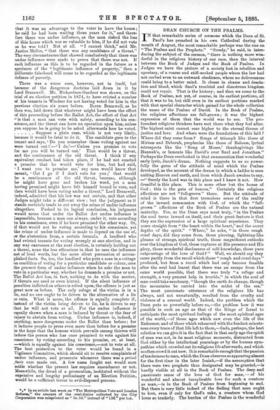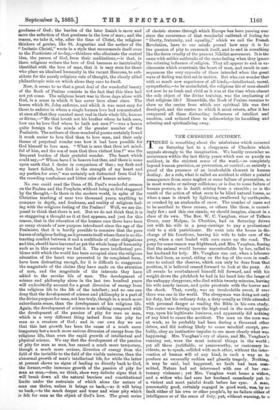DEAN CHURCH ON THE PSALMS.
IN that remarkable series of sermons which the Dean of St. Paul's has preached in his own Cathedral daring the month of August, the most remarkable perhaps was the one on "The Psalms and the Prophets." "Surely," he said in intro- ducing the subject of the sermon, "there is nothing more won- derful in the religious history of our race, than the interval between the Book of Judges and the Book of Psalms. In Judges we have the picture of a society lost in rebellion and apostasy, of a coarse and stiff-necked people whom the law had not curbed even to an outward obedience, whom no deliverances could bring to a better mind.. It closes in shame and desola- tion and blood, which Saul's troubled and disastrous kingdom could not repair. That is the history; and then we come to the Book of Psalms, not yet, of course, in its earliest portions, all that it was to be, but still even in its earliest portions marked with that special character which gained for the whole collection the name of the Psalms of David. In the Book of Psalms, the religious affections are full-grown ; it was the highest expression of them that the world was to see. The pro- foundest religions thinkers have met there what they feel after. The highest saint cannot soar higher to the eternal throne of justice and love. And where were the foundations of this laid 11 Where did they come from ? Songs of triumph like those of Miriam and Deborah, prophecies like those of Balaam, lyrical retrospects like the Song of Moses,' thanksgivings like Hannah's, or laments like David's over Saul and Jonathan." Perhaps the Dean overlooked in that enumeration that wonderful early lyric, Jacob's dream. Nothing suggests to us so power- fully the germ of the attitude of mind which the Psalms developed, as the account of the dream in which a ladder is seen uniting Heaven and earth, and from which Jacob awakes to say, —" Surely the Lord was in this place and I knew it not. How dreadful is this place. This is none other but the house of God : this is the gate of heaven." Certainly the religions affections are not "full-grown" there. Bat the attitude of mind is there in that first tremulous sense of the reality of the inward communion with God, of which the "full- grown " affections of the Book of Psalms are the natural maturity. For, as the Dean says most truly, " in the Psalms the soul turns inward on itself, and their great feature is that they are the expression of a large spiritual experience. They come straight from " the heart within the heart," and the secret depths of the spirit." "Where," he asks, " in those rough cruel days, did they come from, those piercing, lightning-like gleams of strange, spiritual truth, those magnificent outlooks over the kingdom of God, those raptures at His presence and His glory, those wonderful disclosures of self-knowledge, those pure outpourings of the love of God? " Well, we should say they came partly from the recoil which those " rough and creel days" produced, but from a recoil which had only become feasible after the soul had learnt that there was an escape from. the outer world possible, that there was truly "a refuge and strength, a very present help in trouble," in which the soul of man could take sanctuary, "though the earth do change, though the mountains be carried into the midst of the sea." The most passionate utterance of the religious life has always, and not unnaturally, resulted from the cruelty and violence of a sensual world. Indeed, the problem which the Dean puts so powerfully before us,—the problem how it was possible in such an age as that of the Kings of Israel to anticipate the most spiritual feelings of the most spiritual ages of the world,—of those ages which saw even the life of the Redeemer, and of those which rehearsed with the fondest minute- ness every trace of that life left to them,—finds, perhaps, the best solution we can give it in the fact that in that early age the spirit of man was not, in its most religious moments, distracted from God either by the intellectual yearnings or by the human sym- pathies which crowded out its religions life afterwards, and which so often crowd it out now. It is remarkable enough that the passion of tenderness to man, which the Dean observes as appearing almost for the first time in the later Isaiah,—if the assumption that there were two prophets thus designated may be granted,—is hardly visible at all in the Book of Psalms. The deep and passionate sense of the love of God for man, — of his wonderful and almost inexplicable love for such a creature as man,—is in the Book of Psalms from beginning to end. But there is very little indeed of the feeling that man ought to love, even if only for God's sake, a creature whom God loves so tenderly. The burden of the Psalms is the wonderful
goodness of God; the harden of the later Isaiah is more and more the reflection of that goodness in the love of man; and the reason, we take it, why, after the time of Christ, the religious thinkers of genius, like St. Augustine and the author of the " Imitatio Christi," wrote in a style that recommends itself even to the Positivists of to-day,---thinkers who eliminate the central idea, the person of God, from their meditations,—is that, in these religions writers the love of God becomes so inextricably identified with the love of man, that it is easy even for those who place an idealised humanity in the vacant Heavens, to sub- stitute for the purely religious vein of thought, the closely allied philanthropic vein on which alone they care to dwell.
Now, it seems to us that a great deal of the wonderful beauty of the Book of Psalms consists in the fact that this time had not yet come. The religions heart was in those days alone with God, in a sense in which it has never been alone since. The lesson which St. John enforces, and which it was most easy for those to enforce in whom a single human love had concentrated at once all that they counted most real in their whole life, human or divine,—" He that loveth not his brother whom he hath seen, how can he love God whom he hath not seen ?"—was a lesson quite foreign to the minds of the greater number of the Psalmists. The authors of these wonderful poems certainly found it much easier to love God than to love man, and their only theme of perpetual wonder was how it had been possible for God himself to love man. " What is man that thou art mind- ful of him, and the son of man that thou visitest him ?" was the frequent burden of their grateful wonder. The heart which could say,—" Whom have I in heaven but thee, and there is none upon earth that I desire in comparison of thee ; my flesh and my heart faileth, but God is the strength of my heart and my portion for ever," was certainly not distracted from God by the crowding confusions and bitter cries of human misery.
No one could read the Dean of St. Paul's wonderful sermon on the Psalms and the Prophets, without being at first staggered by the thought,—Is there in the modern world, in spite of the Christian teaching of near two thousand years, anything to compare in depth, and freshness, and reality of religious feel- ing with the religious feeling of the Psalms? Well, we are dis- posed to think that there is not. But we do not think that it is so staggering a thought as it at first appears, and jest for this reason, that in the education of the human race there have been so many strands of new purpose introduced since the age of the Psalmists, that it is hardly possible to conceive that the pure leaven of religions feeling, as it presents itself where there is no dis- tracting conflict between it and a multitude of other obligations and ties, should have leavened as yet the whole lamp of humanity such as in this century we find it. The mere intellectual pro- blems with which the world has been occupied since the religious education of the heart was presented in its completest form, have been distracting enough, for it is difficult to exaggerate the magnitude of the claims they have made on the attention of men, and the magnitude of the interests they have added to the secular life of men. The development of science and philosophy alone in the last two hundred years will undoubtedly account for a great diversion of energy from the religions life to the life of the intellect; and no one can deny that the development of science and philosophy is a part of the divine purpose for man, not less truly, though in a much more subordinate sense, than the development of his religions life. Again, the development of science is as nothing compared with the development of the passion of pity for man as man, which is a very different thing indeed from the pity for man as a creature of God ; and in our own day we see that this last growth has been the cause of a much more temporary but a mach more serious diversion of energy from the religious life, than even the rapid growth of intellectual and physical science. We say that the development of the passion of pity for man as man, has caused a much more temporary, though a much more serious, diversion of energy from the field of the invisible to the field of the visible universe, than the abnormal growth of man's intellectual life, for while the latter at present shows no signs of leading us directly back to God, the former,—the immense growth of the passion of pity for man as man,—does, we think, show very definite signs that it will break down all the natural barriers and constitutional limits under the restraints of which alone the nature of man can thrive, unless it brings us back,—as it will bring us back,—to the much deeper and truer and wiser pity which is felt for man as the object of God's love. The great series of electric storms through which Europe has been passing ever since the occurrence of that wonderful outbreak of feeling for "liberty, fraternity, and equality," which we call the French Revolution, have to our minds proved how easy it is for the passion of pity to overreach itself, and to end in something like the fierce cruelty of the present Nihilist movement. It is the same with milder outbreaks of the same feeling when they ignore the sobering influence of religion. They all appear to end in ex- citements which overstrain the heart of man, and result in con- sequences the very opposite of those intended when the great wave of feeling was first set in motion. But who can wonder that with so much new experience of all kinds,—intellectual, moral, sympathetic,—to be assimilated, the religious life of man should not now be as fresh and vivid as it was at the time when almost the sole object of the divine training, was the implanting of that religions life? Meanwhile, the Book of Psalms remains to show us the centre from which our spiritual life was first developed, and the centre to which it must return, after it has conquered all these distracting influences of intellect and emotion, and reduced them to acknowledge its humbling and sobering and spiritnalising sway.



































 Previous page
Previous page